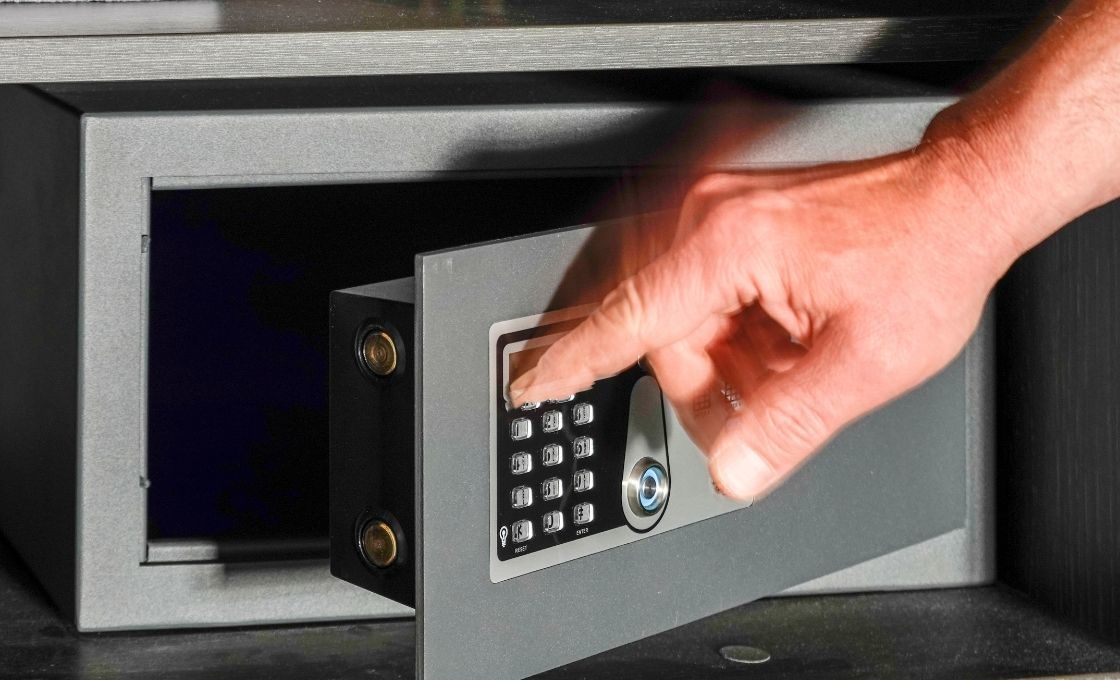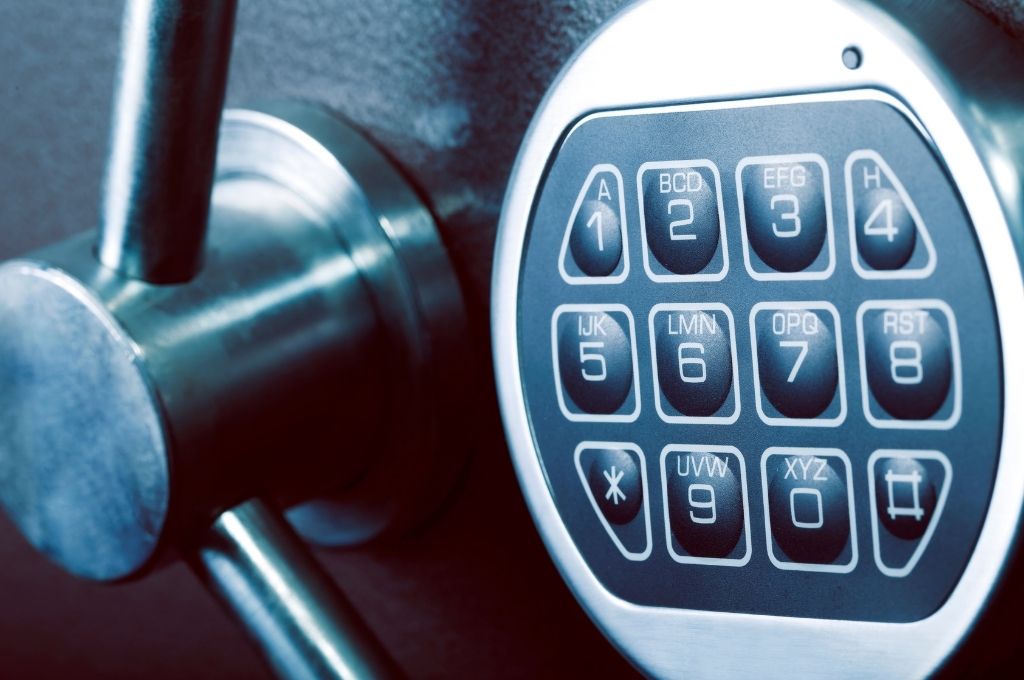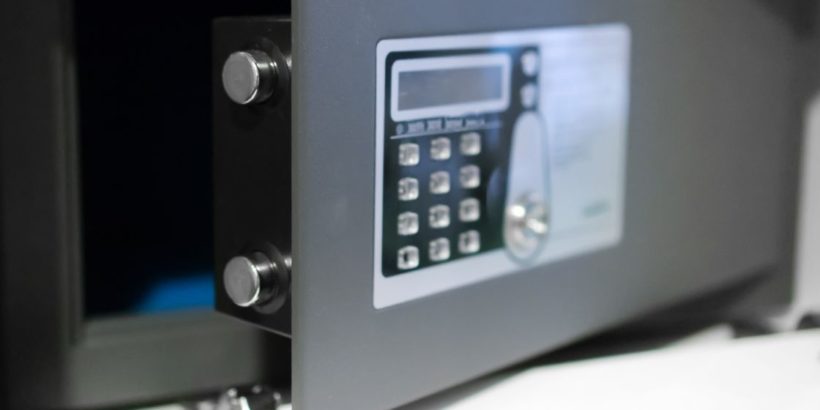Should you use a hotel safe or are you better off hiding your valuables somewhere else?
In this article, I’ll give a breakdown of just how secure hotel safes are (or aren’t) and give you some tips and considerations to think about.
Table of Contents
Is it safe to use a hotel safe?
Generally, a hotel safe is a safer place to store your belongings than open areas in the hotel room but they are not 100% secure.
Below, I’ll cover a lot of the risks and other considerations you will want to think about when storing your belongings.
Tip: Use the free app WalletFlo to help you travel the world for free by finding the best travel credit cards and promotions!

Are hotel safes really needed?
You might first be wondering if hotel safes are really needed?
Well, I would say yes they are needed based on some of the data.
There are studies out there that show that one in three housekeeping workers confessed to seeing a coworker steal cash on the job.
The study also shows that 16% said they were guilty of taking jewelry out of a guest’s room during or after their stay and “more than 27% witnessed a co-worker pick up jewelry they ‘found while cleaning.'”
Those statistics are much higher than I imagined which means that getting your items stolen or “found” by housekeeping is not an anomaly.
Hotel housekeepers should not have direct access to your safe (that should be reserved for management) so this means that placing items in your safe should at the very least make your items harder to steal from housekeeping.
The other threat comes from “door pushers.” These are thieves known to frequent places like Las Vegas and they walk through hallways trying to find doors that are not locked or shut.
So your first line of protection against these people will be locking your door and putting your valuables in a safe will be another level of protection.
Related: 11 Ways to Get a Free Night Stay at a Hotel
No hotel safe is 100% reliable
Master codes/keys
Just about every hotel has a master code or a master key that allows the hotel staff to open up a locked safe. This is because many guests will inevitably forget or lose their combinations to unlock the safe.
Hotel staff employees may have access to this code and also can probably easily get into your hotel room.
What is even scarier is that sometimes hotels will not change the default override code, even though such codes can often be found on the web, on forums, etc.
This means that any random person or someone knowledgeable about lock picking could find the default code and potentially access your safe if they enter your room.
So it is really important to always operate with the mindset that somebody could get to your belongings, even if they are located in a safe.
Hacks
It does not take long when researching to find multiple ways to crack or hack hotel safes.
Some of these methods require a bit more sophistication but others are pretty simple like using a pinhole to access a safe. Some experts have shown how to crack a safe with just a paperclip and pocket knife and it’s probably easier than you imagine.
It would be impossible to cover all of the different ways to crack a hotel safe in this article but the key take away is that many hotel safes can probably be hacked with minimal effort/resources.
Low batteries
Another risk that could occur is that the hotel safe is running on low batteries.
A low battery safe could be disastrous because if it dies it could prevent you from accessing the safe which could be a major inconvenience, especially if you are on a time crunch.
You will likely have to contact the hotel maintenance staff to assist you with opening up the safe and depending on the aptitude and familiarity of the maintenance staff, that could prove to be a very time-consuming ordeal.
Even if they have a master code, a dead safe could present unexpected issues so one drawback to using a hotel safe is that they could introduce additional headache.
Related: Ultimate Late Check-Out Guide for Hotel Stays
Testing the password strength of your safe
Before you ever place any object in a hotel safe, you might want to check to see if the default password has been changed.
On some popular safes such as Saflok safes, the default password might be “999999.”
So if you created a pass code of something like “312879,” you could then test to see if the safe will open with default passwords like 999999, 111111, 222222, etc.
Sometimes you might have to hold the lock button or hit a button before inputting the master password such as the “#” or “*”button twice.
For illustration, here’s an example of someone hacking a Safemark hotel safe.
To test this, you can simply find the manufacturer/model of the safe in your hotel room and then a quick Google search might yield results for the default password.

Belongings to put into the safe
There are a lot of common items that people like to put into hotel safes. I’ll cover a few of these below and present you with some alternative ways of carrying or storing these goods.
How to think about a hotel safe
Before jumping into the items that you would use in a safe, it’s a good idea to think about the reasoning for using or not using a safe.
Some people think of a safe as just a way of making it harder to access your valuables rather than a sure fire method of preventing anybody from getting to them.
To them, putting valuables like a passport or cash in the safe is just making it one step harder for housekeeping/common intruders to take their goods.
On the other hand, a safe is also a place where sophisticated thieves will know to look when it comes to taking valuables.
If they know the master codes, chances are they could get into your safe and out in seconds and may not want to mess around with searching other random areas of the room.
This means that you could be better off finding a really good hiding place for your valuables and relying on stealth for your security.
If you want to really take your security to the next level, you could always put “lesser” valuables in the safe to throw off a potential thief and have your true valuables hidden elsewhere in the room or on your person.
For example, if you had $10,000 in cash on you, you might put a few hundred bucks in the safe and the rest of the cash in some type of hidden compartment within your luggage or belongings.
Passports
A point of debate is whether or not you should place your passport in the hotel safe.
Some travelers prefer to keep their passport on them at all times. This allows them to know without a doubt where their passport is located and if they ever need to use it when out and about they can easily do so.
The drawback is that you could misplace it of course or it could get stolen if it is contained within a bag that gets taken from you.
If you’re not sure the best place for your passport, you can always consider getting a (legal) duplicate passport and keep one passport in each location when traveling.
Duplicate passports usually are only valid for a couple of years so this is something you would have to do on a recurring basis.
Jewelry
Jewelry is another common item that people think about putting in the safe.
It is not recommended to wear expensive or flashy jewelry when visiting certain destinations known for petty theft so the hotel safe is a logical place to put those belongings.
But my recommendation would be to just always avoid wearing your fancy jewelry while traveling.
Cash
Cash might be one of the most common items that travelers will put into a hotel safe. It’s also the most commonly stolen item by housekeeping according to the survey above.
For that reason, putting your cash in the hotel safe is usually a way to decrease the odds of someone stealing your cash.
I would generally avoid traveling with large amounts of cash because it is so much of a security risk and it is so easy to just rely on a credit/debit card.
With that said, cash can be hidden on your person pretty easily with certain types of lanyards or belts.
It might be a good idea to diversify where you store your cash so that you could have cash in the safe, hidden in your luggage, and on your person.
Laptops and electronics
A lot of people traveling with expensive laptops such as MacBook Pros or electronics like fancy Canon cameras, tablets, headphones, etc. might consider putting them into a hotel safe.
These are all worthwhile items to put in a safe but some of them will not always fit.
If you are not able to carry these with you in a backpack as you travel then you might also consider hiding them in your luggage bag.
Just make sure that you also hide the charger and cords so that you do not give thieves any hints as to what type of electronics might be in your room.

Reception area safe
Some hotels have hotel safes located in the lobby area or perhaps behind the check-in desk.
These might appear to be safer but the same risks might be involved when using these safes since hotel management and others will likely have access to these safes.
Hotel liability
Hotels are generally not liable for your lost goods.
Typically, they will have some sort of disclaimer posted somewhere that explains that they are not liable for items left in hotel rooms.
In some cases, this disclaimer could exclude objects stored in a hotel room safe but generally the disclaimer covers objects not placed in the safe.
If a hotel has a broad disclaimer then one of your only routes for getting a hotel to be liable is to prove some type of negligence. For example, you might be able to prove that a hotel room safe was defective.
There is often a lot of difficulty with proving that a hotel staff member stole an item so sometimes these cases can be uphill battles that may not be worth the time and energy required to pursue them, especially if you were talking about a lower amount of money or valuables.
For that reason, I would not rely on a hotel liability policy to get reinstated for your lost items. You are much better off being proactive and trying to wisely choose what items you bring with you and how you store them.
Remembering to check the hotel safe at check-out
A lot of travelers don’t like to use hotel safes because they forget to check the safe before they check out.
They may not remember that they placed valuables in the safe until they are boarding their plane at which point it is too late to run back to the hotel.
You can always set reminders on your smart phone to remind you to check the hotel safe around the time you were checking out but sometimes your checkout time might change or your reminders may not trigger properly.
So my favorite low-tech method for remembering to check the hotel safe is to tie a piece of string to the safe from your luggage bag.
This serves two valuable functions.
First, unless you completely forget to take your baggage with you, you will always be reminded to check the safe before you depart and pack up your bag.
Second, if you pay close attention to the placement of the string and even snap a photo, you will be able to tell if someone has entered your room and perhaps tampered with your safe.
My (anecdotal) personal experience
I have done extensive traveling over the past seven years and stayed in a lot of hotels in different types of countries (first world and not so first world).
I’ve used hotel safes on occasion and other times just placed my belongings in my luggage bags while I am away from the hotel room.
Other times, I have left items in plain sight on the nightstand or some other type of hotel room furniture.
I’ve never had an item stolen from a hotel.
Obviously, my experience is anecdotal but I just wanted to share that it is perfectly possible to do a lot of traveling and never encounter any issues with theft from your hotel room.
Of course, I should probably knock on wood now.
Hotel room safe FAQs
Yes, hotel staff members likely can access your hotel room safe by using a master code/key that can override your personal code.
Traveling with large amounts of cash is generally not a good idea and should be avoided. However, cash is one of the most commonly taken items by housekeeping so placing it in a safe could be a good idea.
On occasion, yes. One survey revealed that 43% of housekeepers reported stealing personal items from hotel guests.
Although it is not a likely occurrence, there are reports online of people having money stolen from the hotel safe.
Your passport is usually safer in the hotel room safe than it would be just lying around the room. However, some people prefer to always keep their passport on their person when traveling.
Final word
A key take away here is that hotel safes can make it one step harder for people like housekeeping or intruders to take your items.
However, if someone has access to the default/master codes they will be able to access your safe and many hotel safes are not that difficult to hack.
So you should never think of a hotel safe as a 100% secure way of storing your goods.
Instead, you should put a lot of thought into what type of objects you need to travel with and what type of alternative storage methods you can use that might be more secure.
Daniel Gillaspia is the Founder of UponArriving.com and the credit card app, WalletFlo. He is a former attorney turned travel expert covering destinations along with TSA, airline, and hotel policies. Since 2014, his content has been featured in publications such as National Geographic, Smithsonian Magazine, and CNBC. Read my bio.


I’ve actually played a little game of sorts, I’ll leave a quarter on a table in my room (or the equivalent in another country). I’ve had the quarter disappear a few times while staying in hotels in the US (even “nice” ones like Zaza or the W) but never once have a had a peso or euro or similar coin taken from my room in another country. Not.Once.Ever. Not the third world or the first world. In a way I think it speaks volumes about society in the USA.
Statistically most hotel housekeepers in the US are foreign born. They probably appreciate the value of American money more than others perhaps.